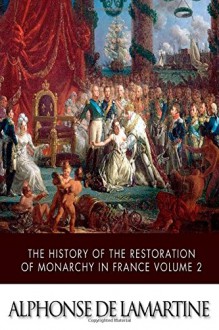This is a history of the Bourbon Restoration in the wake of Napoleon’s demise in the early 19th century. From the preface: “I scarcely exceed the middle age of man, and I have already lived under ten dominations, or ten different governments, in France. Between infancy and maturity I have...
show more
This is a history of the Bourbon Restoration in the wake of Napoleon’s demise in the early 19th century. From the preface: “I scarcely exceed the middle age of man, and I have already lived under ten dominations, or ten different governments, in France. Between infancy and maturity I have witnessed ten revolutions: the Constitutional Government of Louis XVI., the first Republic, the Directory, the Consulate, the Empire, the first Restoration in 1814, the Second Government of the "Hundred Days" by Napoleon, the Second Restoration in 1815, the Reign of Louis Philippe, and the Second Republic:—ten cataracts, by which the Spirit of modern liberty and the stationary or obstructive spirit have endeavoured, by turns, to descend or to remount the declivity of revolutions. My heart has throbbed with these emotions; I have lived in this current of passing events; I have been afflicted or rejoiced at these downfalls, or these successions; I have suffered from these subversions, and I have been instructed by these spectacles. My existence has vegetated, has made a noise, has been matured, has grown old, and has been renewed in me. I have understood, or have fancied I understood, whither the world was tending on the current of destiny. A recent vicissitude has raised me for a moment to the head of one of these movements, between a government which overthrew itself, and a community which it was necessary to collect together, to save and to reconstitute it on a new basis. The Second Republic was the result. This was for a long period, at least, the only system which could rally and incite the people. Monarchies had crumbled beneath them, one after another, whatever modifications might have been attempted in their principles of vitality. Dynasties waging civil wars for the throne, were nothing more themselves than mediums and causes of internecine conflicts, amongst the people, between their respective partisans. Claims upon the crown had become factions. The nation itself was indivisible; its pretenders were divided. The country alone could reign.”
show less

